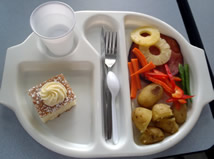The Government announcement of free school meals for all children in reception, year 1 and year 2 of primary school, from next September, will help those poorer children who had been not taken their entitled free school meal because of fears of stigmatisation, according to ISER research into take-up.
The number of UK schoolchildren entitled to free school meals because their parents are in receipt of certain benefits, is an estimated 1.1milllion. However, around 300,000 do not participate in the scheme. ISER research has found that the effect of peer behaviour was a significant influence and that a fear of stigmatisation and segregation from their non-FSM classmates was prompting children from entitled families to bring in a packed lunch instead.
The study by Angus Holford at ISER, found the Scottish government’s experiment to introduce universal entitlement to FSMs in areas of high deprivation raised take-up among those already entitled both during and after the experiment. Elsewhere, anonymised payment schemes – where parents pre-register to pay or to receive the benefit online for example – also raised take-up substantially.
The study looked at every primary school in Scotland and analysed the choices of children and parents there to see that making sure FSM-registered children are not identifiable is only one way to improve participation. Getting more unregistered pupils to take school meals will also be effective. Higher peer-group take-up both reduces the probability that an FSM-participant is forced to eat apart from his friends, and also sends a signal that school meals are enjoyable and of good quality.
Welcoming the news, Anne Longfield, chief executive at the 4Children charity, told The Independent:
“Providing a nutritious, hot lunch for all infants in primary school promotes positive eating habits and helps to ensure that children are able to concentrate and perform well in the classroom. It should also get over the stigmatisation that prevented hundreds of thousands of eligible families claiming in the past – a particular problem in some of the poorest, inner city areas of England.”
Angus Holford’s research featured in The Observer on Sunday 23 September 2012 and has been used as evidence by campaigners and policy makers.
Take-up of Free School Meals: price effects and peer effects by Angus Holford is published by the Institute for Social and Economic Research: working paper series 2012.
For all media enquiries please contact Louise Clarke Cullen, Communications Manager at ISER on 0777 1792393 or 01206 873087 or lcullen@essex.ac.uk
